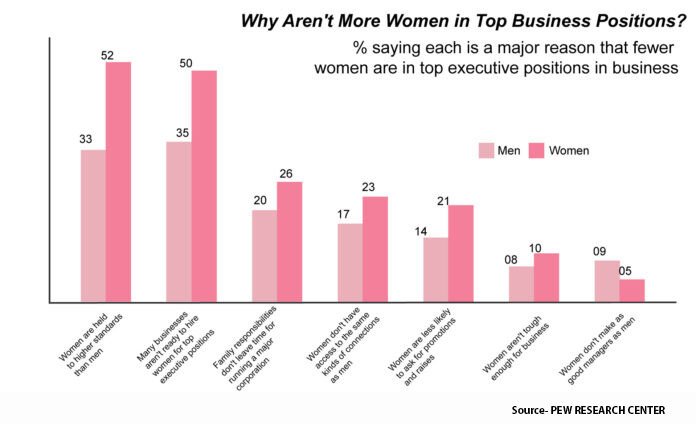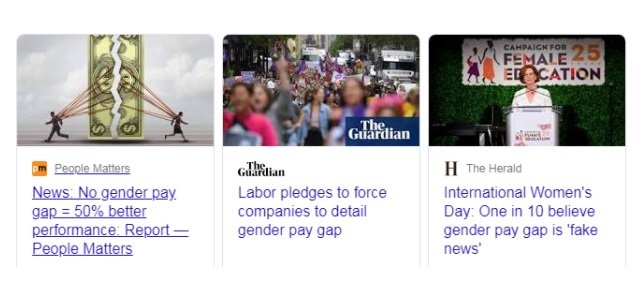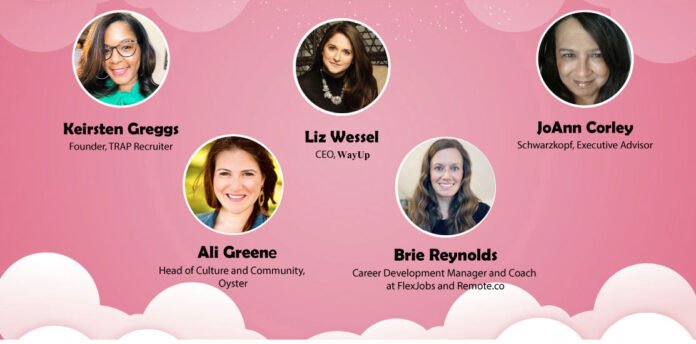Do men have an invisible advantage of being ‘men’ at the workplace? A small experiment mentioned in a news by Independent says, yes. As per the news, two co-workers (a man and a woman) decided to switch names and sign off their emails with each other’s names for two weeks.
What actually prompted this experiment?
Martin and Nicole who were colleagues shared an inbox at work and once Martin realized that a client was unnecessarily being rude and dismissive of his suggestions and questions. Upon inspection he realized that this was because he was signing off his emails under the name of Nicole. He then sent over another email to the client saying that it was Martin and he would be taking over the project from thereon. There was an immediate change in the behavior of the client. The client was now prompt in responding and thanking Martin for his suggestions. This made Martin realize that Nicole was not slow at her job (as accused of by her Boss), she was just having a tough time convincing clients that she knew what she was doing.
So, after this incident, Nicole and Martin switched their signatures for two weeks. And the results?
In Martin’s words, he was in “hell”. The clients that were easy breezy were now a nightmare and extremely condescending. One of them even asked Martin (read Nicole) if he was single.
While on the other hand, Nicole had the most productive work of her career in those two weeks.
When Martin asked Nicole if this was a frequent occurrence, she said not all the time, but it happened a lot.
To which Martin realized that something that was so shocking for him was merely a part of Nicole’s job. Martin realized that she is not dumb, she just took all this in a stride.
This was one incident. Everyday, you will see more and more headlines making it obvious that women are treated differently for being women at the workplace.

We can turn a blind eye and embrace ignorance to justify the gender discrimination that we witness, but there is no denying that even today, women are marginalized and pushed to the corner by blunting their actions.
Unconscious Bias
So many different types of discriminatory activities and scenarios unfold for the women in an organization, ranging from pay gaps, to harassment, and even prejudice. To combat that, companies are now putting in place several initiatives to create an equitable working ecosystem for everyone alike. But, there still exists a lot of unconscious bias.
We asked Keirsten Greggs, Founder, TRAP Recruiter about some of the unconscious biases that women face at the workplace.
 Keirsten Greggs, Founder, TRAP Recruiter
Keirsten Greggs, Founder, TRAP Recruiter
“Gender bias is still very prevalent in the workplace. Women are often subjected to behaviors and treatment that their male counterparts don’t experience. For example, they’re spoken over in meetings, not given stretch assignments or special projects because of perceived family obligations, they’re second guessed when it comes to their technical skills and seen only as credible when it comes to their soft skills, and they’re often viewed as “too aggressive” when they’re simply being assertive in ways that are acceptable for men.”
As many of the ‘women issues’ are dismissed as those being non-work related issues, it is time we learn how to stand up against things that make us uncomfortable. For example, when you hear a derogatory comment being passed at you or another female, do not get defensive towards that person immediately, instead go to the HR and quote the person as it is and ask the department if it is a professionally appropriate behavior. You can tell them that you do not appreciate being spoken to in that particular manner and will not accept any insults that are thrown your way.

Some lesser-known barriers that women face at the start of their careers
 Liz Wessel, CEO, WayUp
Liz Wessel, CEO, WayUp
“Research shows that women feel they need to meet 100% of the criteria to apply for a job, while men usually apply after meeting about 60%. This is one career rule or barrier that we must break. We know job postings typically contain long lists of requirements. However, just because you may not meet them doesn’t mean you shouldn’t apply. For example, if you see that a role says “two to three years experience required” and you have only one, apply anyway! If you have an impressive background and can show that you would be a great culture fit within the organization, often, employers will overlook qualifications such as years of experience or GPA when evaluating you. Plus, you may have one year of part-time relevant experience and one year of full-time, which could be enough.
Women can tackle some of these barriers early on in their careers by finding the right mentor (or mentors) to help guide them. I think it’s vital for professional growth (especially as a recent grad) to have someone who’s been in your shoes to give you guidance and advice. I wouldn’t be the CEO I am today without the mentors in my life. And I actually have mentors for different types of things I need help with! To flip this question on its head, one benefit of being a woman that a lot of people don’t talk about is that many senior leaders at large and small companies are trying their best to lift up women and people of color in the workforce, which means they may even be more willing to mentor women who are rising up through the ranks than others.”

Discriminatory practices against women leaders
Discriminatory practices do not subside when women climb up the success ladder. In fact, they only get worse. Since, now the woman is on top of her game and up in the hierarchy, the face of discrimination changes and leans towards subtlety.
Affinity in any form always has a major play-out in terms of decision-making, be it affinity towards gender that converts into stronger “smoke room-conversations” which ultimately either consciously or subconsciously finds its place in an impending boardroom discussion. These smaller variations in the course of actions, ultimately builds within itself to be stronger barriers for people. And since these scenarios are so subtle and on the DL, identifying and taking actions against them can be a little challenging
Executive Advisor, JoAnn Corley-Schwarzkopf, gives a varied outlook on how women themselves play a role in this discrimination.
 JoAnn Corley-Schwarzkopf, Executive Advisor
JoAnn Corley-Schwarzkopf, Executive Advisor
“I think some of the main, more subtle discriminatory hurdles, are those we place ourselves. Women, in general, tend to undervalue their work, their contribution and thus overall value. Therefore, they don’t adequately advocate for themselves, ensure they have a strong, undeniable voice and personal/professional brand because we confuse confidence with arrogance, being aggressive vs. assertive. Men tend to not have an issue with this even when they are less qualified.”
It is significant that as women we unlearn the lessons of discrediting our contribution and efforts, and learn how to assertively move to the head of the table and be a part of all the executive decisions.
Remote Inclusivity Bias
As organizations go remote, it is further more difficult to ensure inclusivity of women in the decision making process, because many of them still fear not being heard. Virtual meetings have played a role in making females feel left out and not take active part in conversations because they are always interrupted.
 Ali Green, Head of Culture and Community, Oyster
Ali Green, Head of Culture and Community, Oyster
“I remember the mix of excitement and nerves settling in as I was set to join one of my first Leadership meetings, as the only woman in leadership at the time. After an hour of trying to rush to hit the “un-mute” button, share my perspective quickly to avoid being interrupted, or hear someone share my idea a second time, I was feeling discouraged. It took some time to realize, this was not a “me issue” nor an issue with my colleagues — who were considerate and collaborative teammates, but rather a deep flaw in inclusive meeting design.
It should not come as a surprise to anyone that women are interrupted more than men, especially at work. Yet years since my first experience it is still an issue, “45 percent of women business leaders say it’s difficult for women to speak up in virtual meetings and one in five women say they’ve felt ignored or overlooked by colleagues during video calls,” according to a survey conducted in 2020 by the non-profit organization, Catalyst”
Redundancy bias tops it all
Apart from the interruptions in virtual meetings, there are several other issues that have emerged for women with the onset of the pandemic. More and more women feel burned out. A lot of them are finding it difficult to juggle between their family, children priorities and work activities. And moreover, women leaders are more likely to feel pressured to be always on as compared to men. These are extremely alarming concerns for women, leading to them quitting their jobs or considering downsizing their careers.
In fact, organizations often are seen making jobs redundant for women instead of increasing their capacity to facilitate them, when women announce their pregnancies. Joeli Braerley was laid off via a voicemail a day after she told her boss that she was pregnant. A coincidence? Not really. Joeli founded the charity Pregnant Then Screwed, where she said they gave over 32,000 women free legal advice during the pandemic. It is quite evident that the pandemic has accelerated the surge in discrimination against pregnant women and mothers at work.
Hormones and stress do not go well together. Every female goes through several hormonal cycles and changes at different times and frequencies. But the stressful work environment fails to take this into account, at all. Stress can lead to elevated levels of hormones, which is bad for a woman’s health, especially mothers. Stressful jobs can induce early labor and premature births.
Women with higher stressful jobs are more at the risk of heart attacks and cardiovascular events, along with mental health issues such as depression and insomnia.
Due to problems such as these, women are often seen giving their careers a backseat and workplaces neglecting their shortcomings to do right by their female employees.
 Brie Reynolds, Career Development Manager and Coach at FlexJobs and Remote.co
Brie Reynolds, Career Development Manager and Coach at FlexJobs and Remote.co
Brie Reynolds, Career Development Manager and Coach at FlexJobs and Remote.co shares her insights and go to strategies for levelling the playing field for all women and elimination of discrimination of any kind.
“There is still a lot of inequality when it comes to women being able to advance their careers and achieve leadership positions. For example, it’s been estimated that 43% of working women quit their jobs when they have children. By comparison, only 28% of men say that they’ve ever had to reduce their hours in order to care for a child or family member. Flexible work can play a large role in quickening the pace of closing the gender gap. One of the major organizational strategies that will support gender equality in the workforce is flexible work – and specifically, remote work. In light of remote work’s rise during the pandemic, companies should be even more energized to institute strong remote work policies.”
Addressing the Elephant in the Room – Pay Disparity

The most common and evident form of gender discrimination is the pay disparities between these two groups.
According to the Global Gender Gap Index 2020, it is estimated that the global average of a woman’s income is about $11,000 and that of a man is $21,000.
A woman who is doing the same job as a man, has the same bills as a man does, pays the same rent as a man does, is being paid less than the man. Why? Not because of lower qualifications or productivity, but because of gender. Despite there being laws in place to address and resolve the gender pay gap, it is still very much prevalent in todays’ organizational landscape.
Remote Work as the light in the end of the tunnel
“Through research we’ve done at Remote.co, we see that remote work plays a role in closing the gender pay gap.
- Women make up 42% of the leadership at the 16 remote companies we interviewed (compared to 14.2% at S&P 500 companies).
- 28% of the 53 remote companies we researched have a female founder or co-founder (compared to 18% of all startups in 2014).
- 19% of those 53 remote companies have a female CEO (compared to 4% of S&P 500 companies)” – Brie.
Solution Scape
To ensure that our organizations offer equal opportunities and equitable areas of growth for women, there are certain things that women employees as well as the employers need to do.
And the most important one is to take conscious measures and steps.
For women, it means to start being strategic about their careers at the very start.
“Everyone should be strategic about their first job or internship because it’s one of your first opportunities to figure out what you like and don’t like to do professionally (it’s just as valuable to know what you don’t enjoy doing as what you do). Other benefits include
1) lasting connections with the people who work at the company (not just your manager!) and
2) actual skills and on-the-job learnings — whether trying out new software or getting experience with project management and deadlines. You can refer to these in future interviews, in your resume, and use your new skills in future jobs! After your first role or internship, you’ll not only have some experience under your belt, but you’ll also have a better idea of where you want to take your career so that you can be even more strategic moving forward. Whether it’s your first or your tenth, every job matters, especially when you consider how much time you spend in your job, it’s critical to make the most out of it.” – Liz Wessel
What organizations can do to be a catalyst for change?
- Dissociate women leaders’ criticism from arrogance and link it to constructive feedback.
- Give more exposure to women execs in different areas to explore their expertise and outshine.
- Celebrate accomplishments out in the open and make it a statement.
- Offer mentorship and guidance to the dark horses.
- Reform your policies in accordance with resolving the pain points of women employees (eg – wage transparency, period leaves, maternity support, flexi work arrangements, etc)
- And most importantly, acknowledge women as powerful and dignified individuals.
Opposing gender discrimination at workplace is not enough, anymore. We now need to take conscious efforts to eliminate hostility across organizations to make them better suited for women. Envisioning an optimistic future, reformation in strategies and policies is highly significant. There’s a lot of reconditioning that will be needed internally and externally for uplifting more and more women to live up to their potential leaving behind their self-doubt.
The aim is to not break the glass ceiling, but to create an environment where there are no limits or conditions to succeedings!
For more such Updates Log on to www.hrtechcube.com
ABOUT THE AUTHOR

Tanvi Tirthani
Content Contributor, HRTech Cube
Tanvi Tirthani is a content writer and strategist with a special foray into technology. She has been a keen researcher in the tech domain and is responsible for strategizing the social media scripts to optimize the collateral creation process.












